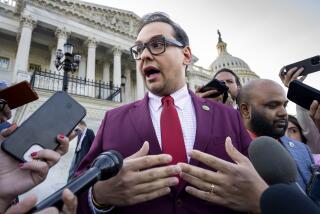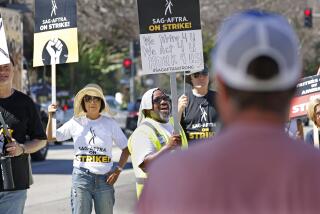Teamster Chief Carey Expelled and Banned for Life by Panel
- Share via
Teamsters President Ron Carey was barred for life Monday from his scandal-plagued union by a federal panel that found he took part in an illegal fund-raising scheme to boost his reelection.
The decision represents a final dishonor for the 61-year-old union leader. He was disqualified in November from running for reelection because of his alleged involvement in the same scheme.
The expulsion brings to an end the six-year tenure of Carey, who won the Teamsters’ top post in 1991 largely on promises to root out corruption in the union, long known for its history of corruption and its links to organized crime.
Both Carey and former Teamsters political director William Hamilton, who was also permanently barred Monday from holding office or membership in the union, can appeal their expulsions to a federal judge. The two union officials have always maintained that they were unaware of the fund-raising conspiracy.
Their expulsions by the Independent Review Board come as the union is facing increasing uncertainty over its presidential election, scheduled for later this summer.
In papers filed in a New York federal court last Friday, the Justice Department said the union should be made to pay for its own rerun election because the government is unable to foot the bill.
The Teamsters, which is the nation’s largest union of private sector employees, with 1.4 million members, was placed under government supervision in 1989 amid allegations that the organization had fallen into the hands of corrupt leaders.
Monday’s decision stemmed from the 1996 election race between Carey and James P. Hoffa Jr., son of the legendary former Teamsters leader. After Carey won by a 58%-42% margin, the results were voided when investigators discovered the fund-raising conspiracy.
According to investigators, Carey’s campaign diverted $885,000 in Teamsters money to make political contributions to advocacy groups including Citizen Action, the National Council of Senior Citizens and Project Vote. In return, officials and wealthy supporters of those groups poured back $327,000 to Carey’s reelection effort.
Carey’s former campaign manager and two consultants have pleaded guilty to charges stemming from the scheme. Hamilton was indicted by a federal grand jury.
Last November, a court-appointed overseer disqualified Carey, finding that the union leader had lied when he told investigators he knew nothing of the fund-raising conspiracy.
In their report Monday, three members of the Independent Review Board--which oversees the union under a 1989 consent decree between Teamsters leaders and the Justice Department--split over whether Carey knowingly participated in the scheme or was negligent of his duties.
The majority opinion, by former federal judge William H. Webster and labor lawyer Grant Crandall, said Carey simply failed “to exercise his required duty of inquiry with respect to the unusual transactions.”
“A fair inference is . . . that Carey closed his eyes because he knew of or suspected those contributions were to generate a personal benefit for him,” the majority stated.
But the panel’s other member, former federal judge Frederick B. Lacey, was even harsher. “Carey did know that the contributions were to result in a benefit to his campaign fund-raising,” he wrote.
Labor experts said Monday’s expulsions of Carey and Hamilton will have little impact on this year’s presidential race between Hoffa Jr. and Tom Leedham, head of the union’s warehouse division who replaced Carey as the candidate of the union’s reform wing.
“The expulsion is more of a personal blow to Carey,” said Carl Biers, head of the Assn. for Union Democracy, a New York advocacy group. “The damage was done a long time ago when Carey was disqualified last year.”
But the Teamsters’ race still appears to be in jeopardy. Last week, government lawyers said in court that they lacked funds to pay for the Teamsters election, which should be completed by Oct. 14.
Congressional Republicans have blocked $8.6 million needed for the election, saying they were outraged that $17.5 million in public money spent on the 1996 race had been corrupted and wasted.


